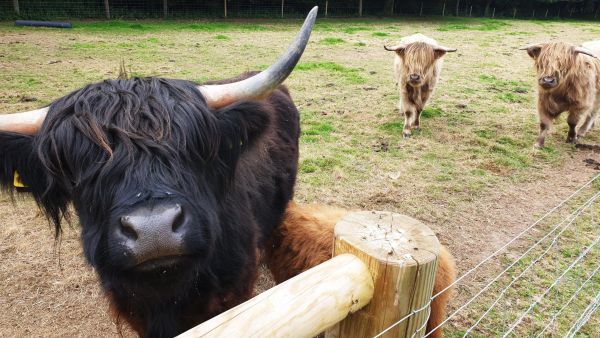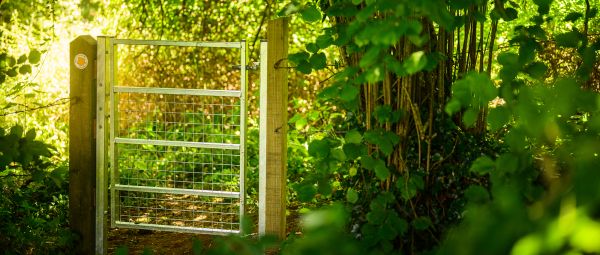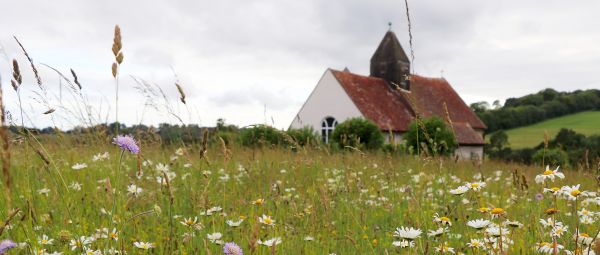Rules around keeping animals in fields with paths
Most farm animals including horses, sheep, cows, and dogs can be kept in fields with public paths.

Advice note relevant to England and Wales only. Find information about walking on farmland in Scotland.
What’s allowed and how to take action
When out walking you may encounter a situation with animals in fields with paths that you consider to be dangerous. Most farm animals and domestic pets can be kept in fields with public paths. This includes horses, sheep, cows, goats, and dogs. Except for dogs deemed dangerous under the Dangerous Dogs Act 1991, the law does not consider these animals to be a danger.
Animals that must not be kept in fields with paths
Bulls
Bulls (adult, whole, male cattle) must never be kept alone in fields with public access. Bulls that are not of a recognised dairy breed can be kept in fields with public access if they are accompanied by cows or heifers. Bulls of recognised dairy breeds must never be kept in fields with public access, even if they are accompanied.
Farmers should display simple signs declaring there is a bull in the field, but they should not try to discourage walkers from using the path. The signs should be removed or covered when the bull is no longer in the field.
If you are concerned that a bull is being kept in a field with a public path illegally, always ask the local authority to investigate.
Animals the owner knows to be dangerous
Sometimes farm animals and domestic pets behave in ways that could pose a danger to walkers. Common examples are:
- cows can become aggressive towards walkers with dogs if they are protecting calves
- guard dogs sometimes bark at or even bite walkers
- young horses and stallions can be quite aggressive
- bullocks can be quite inquisitive and playful
Landowners and farmers are only liable for any injury or damage caused by animals if they have been made aware that the animal could be dangerous. Therefore, it’s important that everyone reports incidents and near-misses to the local authority and Health and Safety Executive.
Once reported, if the owner does not take action to move or fence off the dangerous animal, then they become liable for any injury caused.
Guard dogs
It is not uncommon for guard dogs or farm dogs to bark aggressively at walkers. If the farmer or landowner does not intervene, you should report the incident to:
- the relevant local authority
- the dog warden
If you are bitten by a dog, you should also report the incident to the police.
Dangerous wild animals
The Dangerous Wild Animals Act 1976 includes a list of animals considered to be dangerous. These animals must not be kept in fields with public access. These animals require a license to keep and must be kept in an escape-proof enclosure.
The list includes lions, tigers, bears, primates, elephants, and rhinoceroses.
In the unlikely event that you encounter any animal listed under the Act, you should contact the police immediately.
What to do if you experience a problem
Whilst you can minimise your risk of experiencing a problem when walking near animals, if an incident does occur, once you are safe at home, you should report the incident to:
- the local highway authority (county council or unitary authority)
- the Health and Safety Executive if you have an incident with cattle or any animal being kept by a business
To report an incident, you will need to share the following information:
- Location (e.g. a grid reference, path number, name of farm)
- Details of the farmers or land manager if you know this
- Description of what has happened
- Photographs to illustrate the incident if you have them
- Details of anyone else you’ve reported the incident to
- Your personal details for ongoing communication
The council will visit the site to investigate how dangerous the animal is and whether further action is needed.
If an animal attacks you (or someone you are with, or your dog), and it results in an injury, this should also be reported to the police immediately.
More information
The Countryside Code is your guide to walking safely in the countryside. It contains further advice on how to walk safely and responsibly through farms.

Rights of way and cattle
Serious incidents relating to cattle are rare. But when they do occur they can have profound consequences so farmers should minimise the risks to walkers.

Dealing with problems on public paths
The Ramblers guide to reporting problems on public rights of way in England and Wales. Who is responsible, how to contact them and what to expect.

Get off my land
Our advice on what landowners can and can’t ask of you, plus what to do if you have a problem with a landowner.